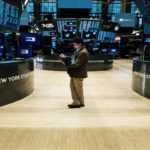
(NEW YORK) — It was another volatile day on Wall Street as investors worry that high inflation may finally be catching up with consumers.
The Dow Jones Industrial Average lost 236 points, one day after plunging more than 1,100 points, while the S&P 500 inched closer to bear market territory — market shorthand for a 20% fall from a recent high.
“It’s important to remember that the market is not the economy,” Art Hogan, chief market strategist at National Securities told ABC News. “The market is a predictor of what the economy might look like six or 12 months down the road. So right now, I think the market is trying to tell us there’s a chance the economy could get worse than it is right now.”
This week’s stunning stock sell-off was triggered by weaker-than-expected profits from retail giants including Target (TGT), Walmart (WMT) and Kohl’s (KSS). Each company cut its profit outlook for the year and said higher costs for labor and transportation hurt its bottom line.
Consumers are still spending despite surging prices. Retail sales rose 0.9% in April, about in line with estimates, but they’re starting to adjust their spending habits.
On Walmart’s earnings call, CEO Doug McMillon said shoppers are beginning to switch from discretionary purchases to lower-margin items such as groceries and other household staples.
Record-high gas prices continue to take a bite out of household budgets. Gas prices are now above $4 per gallon in all 50 states, and analysts expect prices to go even higher. JPMorgan Chase predicted the busy summer driving season could push the national average past $6 per gallon by August.
Economists expect those higher gas prices to fan inflation, which is already at a 40-year high thanks to a perfect storm of factors: strong consumer demand, persistent supply chain disruptions, labor shortages, COVID-19-induced lockdowns in China and now the war in Ukraine.
The Federal Reserve is answering back by aggressively raising interest rates to curb consumer demand and bring down inflation. Investors fear those higher rates will slow growth so much that they will tip the economy into a recession.
Sixty-eight percent of CEOs surveyed by The Conference Board now expect the Fed’s war on inflation to trigger a recession sometime next year, according to a press release.
Copyright © 2022, ABC Audio. All rights reserved.
